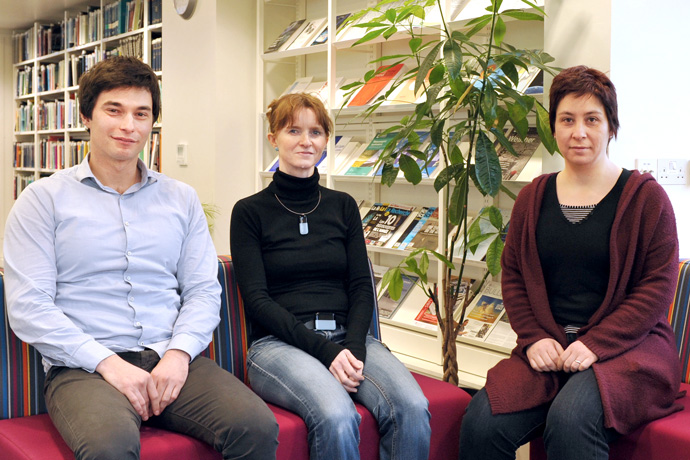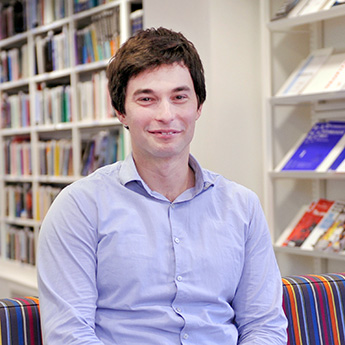

ECMWF’s Graduate Training Programme is an important aspect of our strong scientific cooperation with Member and Co-operating States. The programme provides advanced training for recent graduates from ECMWF Member and Co-operating States who are employed by their national hydro-meteorological services in areas related to numerical weather prediction.
The idea is to contribute to the European pool of well-qualified young professionals in modelling and data assimilation for numerical weather prediction, meteorological operations and large-scale computing support.
Director of Forecasts at ECMWF Florian Pappenberger says: “The Graduate Training Programme allows us to attract excellent staff from our Member and Co-operating States. This strengthens our cooperation and helps to guide ECMWF’s efforts to efficiently meet the needs of the Member and Co-operating States.”
Five graduate trainees from the national meteorological services of Croatia, Hungary, Ireland, Serbia and Norway are currently working at ECMWF as part of this scheme. Here, three of the trainees describe their experiences since the start of their placements at ECMWF in summer 2017.
Toni Jurlina, National Meteorological and Hydrological Service of Croatia
 I joined the EFAS/GloFAS team at ECMWF in June 2017 to work on the development of new global flash flood forecasting products. At the National Meteorological and Hydrological Service of Croatia, I worked as a flood forecaster after completing an MSc in Meteorology at the University of Zagreb.
I joined the EFAS/GloFAS team at ECMWF in June 2017 to work on the development of new global flash flood forecasting products. At the National Meteorological and Hydrological Service of Croatia, I worked as a flood forecaster after completing an MSc in Meteorology at the University of Zagreb.
In the last seven months I've enjoyed working with very talented and devoted scientists, who are keen to help and encourage others. Learning from them is the greatest benefit possible during my time here.
At numerous workshops I have attended, I have been introduced to various ECMWF tools and products, which are helpful for my current and later work. Right now I'm finishing writing a scientific paper that summarises my research during the first couple of months. I also prepared a poster that was presented at an international conference.
All the expectations I had about ECMWF have been far exceeded due to the professionalism of the staff, wonderful intercultural relations between people, and the amount of knowledge that is available at any time. The experience that I’ll gain as a Graduate Trainee will greatly facilitate future work and open new horizons.
Gabriella Szépszó, Hungarian Meteorological Service (OMSZ)
 I joined the Research Department in August 2017 to work on idealised configurations of the IFS/OpenIFS models. I came from the Hungarian Meteorological Service, where I was coordinating the regional climate modelling activity as well as teaching the numerical weather prediction and dynamical modelling for meteorology and applied mathematics students at the Eötvös Loránd University in Budapest.
I joined the Research Department in August 2017 to work on idealised configurations of the IFS/OpenIFS models. I came from the Hungarian Meteorological Service, where I was coordinating the regional climate modelling activity as well as teaching the numerical weather prediction and dynamical modelling for meteorology and applied mathematics students at the Eötvös Loránd University in Budapest.
My main task at ECMWF has been to carry out experiments to demonstrate the model capabilities set out in the OpenIFS reference paper and to serve as benchmark case studies for users. We chose two severe-impact European storm events, Xavier and Desmond, predicted with different operational forecast skill in December 2013 and 2015. The input data needed for the model runs, the evaluation programmes as well as the prepared figures are provided for users on the OpenIFS web page with detailed documentation. We would like users to take this package to compare the results of their installed model version with the ones run at ECMWF or to compare the results of different model versions.
I am also planning to offer a topic on OpenIFS for the students in Budapest. They can work on reconstructing one of the reference case studies and go through the model runs, visualisation and evaluation step by step. This will also be helpful for ECMWF’s OpenIFS team, as we can test how people outside ECMWF are able to apply the new evaluation package and we can improve it based on their feedback.
My next work phase will focus on the idealised configurations. These configurations, such as baroclinic wave and aquaplanet experiments, allow us to investigate fundamental dynamical and physical questions.
I always wanted to experience the atmosphere of a centre where the main efforts are dedicated to developing and improving a weather prediction model. There is room and time to work independently at ECMWF, as well as the chance to work in an inspiring and supportive team. OpenIFS is an important bridge between the Centre and the academic world outside. I am looking forward to lots of interesting discussions at the upcoming workshops and user meetings.
Milana Vuckovic, Republic Hydrometeorological Service of Serbia
 I joined the Development Section in the Forecast Department in June 2017 to work on the connection between Metview and the web chart framework and to contribute to Metview and Magics++ example galleries and to the styling of graphical products for the web and the interactive globe.
I joined the Development Section in the Forecast Department in June 2017 to work on the connection between Metview and the web chart framework and to contribute to Metview and Magics++ example galleries and to the styling of graphical products for the web and the interactive globe.
At the Republic Hydrometeorological Service of Serbia, I worked mainly as a forecaster but also on the visualisation of short-, medium- and long-range forecasts, as well as the visualisation and verification of aviation forecasts.
There, I mostly had experience with ECMWF software products from the user's point of view, and being involved in their development has been both challenging and exciting so far.
The first couple of weeks were rather daunting as I had to adapt to a new country and work environment, but things soon settled as I got a group of new friends in other Graduate Trainees to share experience and help each other.
The Graduate Training Programme at ECMWF is a once-in-a-lifetime opportunity for me, not only to get to know the Centre from the inside and contribute to developments, but also to learn and build new skills. The focus is on learning and we are encouraged to attend any lectures, workshops, seminars or training courses organised at the Centre which we find interesting.
I expect the remainder of my secondment at ECMWF to be as exciting and interesting as it has been so far. Afterwards, I expect to use my experience to help my meteorological service make better use of ECMWF forecast and software products, and also to strengthen the connection between ECMWF and the Hydrometeorological Service of Serbia.
More information
- Graduate trainees enjoyed their time at ECMWF, ECMWF Newsletter No. 149, Autumn 2016
- Vacancies for Graduate Traineeships are posted on our Jobs page as they arise.
